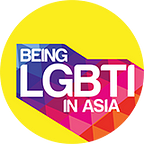Report details workplace discrimination faced by LGBTI people in China, the Philippines and Thailand
27 June 2018
According to a new United Nations study, high levels of lesbian, gay, bisexual, transgender and intersex (LGBTI) people — 21 percent of respondents in China, 30 percent in the Philippines and 23 percent in Thailand — reported being harassed, bullied or discriminated against by others while at work because of their sexual orientation, gender identity, expression and sex characteristics (SOGIESC).
The study was undertaken jointly by the United Nations Development Programme (UNDP) and the International Labour Office (ILO) and was launched today at the Queer Asia Conference hosted by the SOAS University of London. It involved a desk review as well as collection of quantitative data from 1,571 respondents and qualitative data from in-country focus group discussions with 151 participants. The report, entitled LGBTI People and Employment: Discrimination Based on Sexual Orientation, Gender Identity and Expression, and Sex Characteristics in China, the Philippines and Thailand, makes concrete recommendations for governments, the private sector, civil society, multilateral agencies and non-government organizations to take action to improve the situation for LGBTI people in employment settings.
Achieving decent work for all is one of the 17 Sustainable Development Goals (SDGs) and an important component of the post-2015 development agenda, which has at its core the principle of equality and non-discrimination.
“Access to decent work forms an essential part of LGBTI people’s lives and is deeply intertwined with their socio-economic empowerment and ability to participate in the public sphere,” said Jaco Cilliers, Chief Policy and Programme Support at UNDP Bangkok Regional Hub. “Discrimination towards LGBTI people in the workplace also represents a fundamental challenge to the achievement of the 2030 Agenda for Sustainable Development’s commitment to ‘leave no one behind’.”
Respondents in the study reported a range of negative experiences in the workplace, including people making jokes or slurs about LGBTI persons, gossiping or sharing rumours, or making critical comments about how they dress, behave or speak.
Some 10 percent of respondents in China, 21 percent in the Philippines and 28 percent in Thailand believed that they were denied a job due to their SOGIESC. In China, the Philippines and Thailand, more than two-thirds said they had seen a job advertisement that explicitly excludes their SOGIE in the job requirement.
“Employers should recognize that being LGBTI-inclusive is not only a good practice, but also makes great business sense, and can establish a competitive advantage over other companies that are not inclusive,” said Kofi Amekudzi, Senior Technical Specialist at ILO. “LGBTI inclusion in the workplace means respecting the rights of LGBTI people to work, and to work with dignity and with their human rights valued.”
The evidence shows that the few workplaces that have LGBTI-inclusive policies have seen positive impacts. The higher number of protective policies correlates with less experience of workplace discrimination and higher levels of reported job satisfaction among LGBTI people. A more open and affirming workplace is likely to encourage satisfaction and greater loyalty among LGBTI employees, and lead to greater productivity and improve the corporate image.
“Creating better workplaces for LGBTI employees will benefit the national economy, individual companies, organizations and departments, and the economic life and social well-being of LGBTI people and their families,” said Prof. Suen Yiu-tung, Director of the Sexualities Research Programme at the Chinese University of Hong Kong and one of the authors of the study.
The report also highlighted that there were limited legal protections from discrimination in the workplace in the three countries, and there were also few options for recourse through internal workplace policies. Only 5 percent of the respondents in China, 20 percent in the Philippines and 17 percent in Thailand stated that their employers have an official complaint procedure in place for LGBTI discrimination cases.
Among the three countries in the study, only Thailand has a national law, the Gender Equality Act B.E. 2558 (2015), that provides protection against discrimination based on gender expression. In the Philippines, some limited legal protection for LGBT people exists at the local level. Local ordinances, along with other grounds, protecting people against discrimination based on SOGIE only exist in 5 provinces, 15 cities, 1 municipality and 3 barangays (villages). China’s national labour law currently does not specifically provide protections to LGBTI people against discrimination in the workplace.
Downloads:
For more information, contact:
Ian Mungall, Programme Analyst, HIV, Health and Development, UNDP Bangkok Regional Hub
ian.mungall@undp.org | +66 909710908
Originally published at http://www.asia-pacific.undp.org/ on 27 June 2018.
